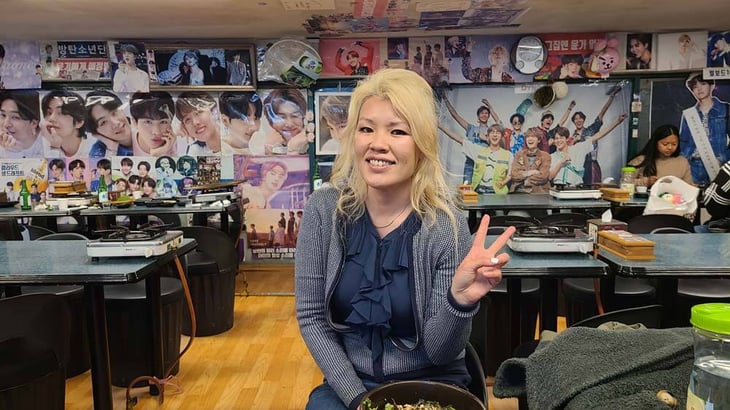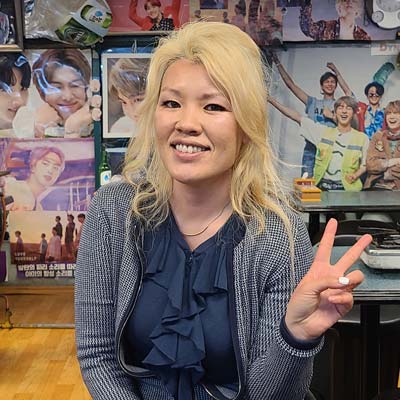Teaching English in Seoul, South Korea: Q&A with Kimberly Wong
ITA alumna, Kimberly Wong, talks about life teaching English in Seoul, South Korea this past year as she navigates working part-time at two separate schools and enjoying the culture of the country where she was born.
Written By: Kimberly Wong | Updated: June 29, 2023
Written By: Kimberly Wong
Updated: June 29, 2023

What is your citizenship?
United States
What city and state are you from?
San Jose, California, USA
How old are you?
35
What is your education level and background?
Master's Degree or higher.
Have you traveled abroad in the past?
I've traveled to Mexico, Canada, Costa Rica, Jamaica.
What sparked your interest in going to teach English abroad?
It seemed like a great opportunity to get immersed in a different culture and experience life abroad, while continuing to teach.
What were some of your concerns before teaching abroad?
I was most concerned about ending up working for a good school. You see a lot of horror stories online about toxic or illegal work environments.
What did your friends and family think about you moving and teaching abroad?
My friends and family were surprised at the news, but were supportive. I've always been independent and never hesitated to up and move alone to a different state in the U.S., so this was just the next big step!
Why did you decide to get TEFL certified and choose International TEFL Academy?
I knew I wanted to teach in South Korea, where a TEFL is required. There are a lot of companies that offer a TEFL (and were honesty much cheaper!), but I chose ITA because of their positive reviews and the support system they offer. I also had a positive experience talking to someone on the phone to get the details of the program before choosing to enroll.
Which TEFL certification course did you take?
I took the 11-Week Online TEFL Course.
How did you like the course?
For an asynchronous course, the material was presented well through the online portal. I struggled with some assignments because I had never made a lesson plan in this format before, and I didn't understand some of the feedback that was provided. However, my instructor was willing to set up a Zoom meeting to help explain the concepts better, and I improved a lot after having that extra clarification. I enjoyed completing the practicum the most. I tutored one-on-one with a student from South Korea, as well as got to be the instructor for a full ESL course. It was the best way to get a crash course in teaching English in real life. I also would not have been able to get the practicum opportunity were it not for ITA's resources. In the midst of the pandemic, teaching opportunities were scarce, but an ITA alum posted the opening on the ITA Facebook page and that is how I was referred. I also got to meet another ITA student who became my co-teacher, and who is now a close friend!

How has your TEFL training helped you in your current teaching position?
The TEFL training gave me a well-rounded foundation for teaching English. Whether it is making sample lesson plans for a job application, or knowing how to best present the material, it has been a useful experience.
Where did you decide to teach and why did you choose this location?
I have been teaching English in South Korea since 2021. It's now been over six months, but I plan to stay for at least 2 more years--but possibly forever! I was born here, so I wanted to experience my home culture for the first time. It is also a country that offers some of the best teaching conditions as far as pay, benefits, etc. I also love all that Korea has to offer (e.g., high-tech, food, music, historical sites).
What school, company, or program are you working for?
I work part-time for 2 different companies, SAUK and Zeta English.
During which months does your school typically hire?
Year-round.
Did you secure this position in advance of arriving?
No - I interviewed in-person here in South Korea.
What kind of visa did you enter on and what was the visa process like?
My visa experience was much different than most English teachers who get an E2 visa. Since I am a former Korean citizen, I was able to get an F4 (Overseas Korean) visa, which allows me a lot more freedom. I can stay in the country legally while not working or being a student, or only working part-time. My visa is not tied to an employer, which is an advantage. However, the paperwork to get this visa was an arduous process. I applied through my local Korean consulate and it required finding a lot of birth documentation and information such as my former ID number.
What are the qualifications that your school requires for teachers?
Bachelor's Degree, TEFL Certification, and a native English speaker.
What is the best way to apply?
Email.
Tell us about your English teaching job!
My current work situation is also very different from most teachers here since it is part-time. I pick up semesters of classes or individual tutoring sessions. On average, I work about 10-20 hours a week. Both schools cater to older students (who I prefer teaching), so my students are high schoolers who are preparing for college or studying abroad in the US/UK. The salary is higher than most standard year contracts per hour (I make 50,000krw/hour, as opposed to 2.1+ million krw a year), but I also do not get paid vacation, housing allowance, or health insurance contributions as a part-time worker. I still teach part-time online for a U.S. university (not allowed on an E2 visa), so I use my Korean salary to live on and put my U.S. salary in savings. I know my situation is quite unique, but if anyone else is in a similar position, I hope this is helpful!
Please explain the cultural aspects, public transportation, nightlife, social activities, food, expat community, dating scene, travel opportunities, etc...
Public transportation is amazing, both intra and inter-city. The bus/train/subway system is very well planned, and quick and easy to use. It costs about $1 a ride, and the average wait time is about 3-4 minutes. There are so many beautiful nature spots to visit, and tons of historical landmarks that are still preserved (palaces, fortresses, folk villages, etc.). You can take KTX to pretty much anywhere in the country, or if you have an International Driver's Permit, I recommend renting a car and driving to the more rural parts. Restaurants and cafes are so good here! Korean food is delicious and cheap, and they have the cutest themed or trendy coffee shops. However, Western food and produce are pretty expensive, so it's best to eat like a local to save the most money. There are also a lot of fancy cocktail or themed bars, which are fun to visit. There is a large number of expats here, especially in certain neighborhoods like Itaewon. You can also meet people through Facebook expat groups.
What are your monthly expenses?
Rent = $685 (considered expensive for a small studio)
Utilities= $100
Food= $700 (I live off delivery, which is much more expensive, and I often splurge on delicacies like fruit)
Transportation=$50-85 /month (depending if I take trips on KTX to another city)
Phone bill = $35
Social Activities: Around $50 (tickets to places are pretty cheap, and I mostly go to cafes or restaurants with friends, so that goes in the food category)

How did you find somewhere to live?
This is tough if you don't take employer-sponsored housing. Since I work part-time, I had to find an apartment all on my own. Do some research beforehand and come prepared with the required deposit money. In Korea, standard apartment deposits can range from $5-20k USD, but most are about $5-10k USD. There are apps like Zigbang and Dabang to find ads, or you can just pop into a local real estate office. Most apartments here require the use of a broker and you must pay a fee when you sign the contract. They are not rented directly by the management office. Some owners do not want to rent to foreigners because of the language barrier, so you may face some discrimination. It helps if you can bring a Korean friend with you to translate if you are not fluent in Korean.
How would you describe your standard of living?
Good! I have a much tinier apartment than in the U.S., but other than that, I am living at the same standard, just at a cheaper cost.
In your opinion, how much does someone need to earn in order to live comfortably?
If you get a job that includes housing, you can live comfortably off of $500-1000 a month, depending on how frugal you are. If you need to pay for your own housing, I would say $1000-2000, depending on the type of apartment you select.
What advice would you give someone planning or considering teaching abroad? Would you recommend teaching in your country?
Do your research beforehand - there are a ton of resources online about everything, including getting the visa, what to pack, how to get an ID card in Korea, opening a bank account, how to take the subway, etc. You want to know how all this works before you come so you can hit the ground running. Also, make sure to look into your school's reviews, talk to former teachers, and have your contract looked at by your ITEFLA advisor! Yes, I would absolutely recommend South Korea to teach. It is not going to be the life you see in the K-dramas, but it is a really enriching cultural experience and you will be glad that you did.
Kimberly Wong
Kimberly Wong is a 35-year-old who was born in South Korea but grew up in San Jose, California. She has a B.S. in Justice Studies from San Jose State University, a M.S. in Criminal Justice from California State University Long Beach, and is currently in her fourth year of Ph.D. studies in Criminal Justice & Criminology at Texas State University. She currently teaches forensic science to university students online and worked as a crime scene investigator at a police department for seven years before deciding to move abroad to teach in her country of origin.
Want to Learn More About Teaching English Abroad & Online?
Request a free brochure or call 773-634-9900 to speak with an expert advisor about all aspects of TEFL certification and teaching English abroad or online, including the hiring process, salaries, visas, TEFL class options, job placement assistance and more.








